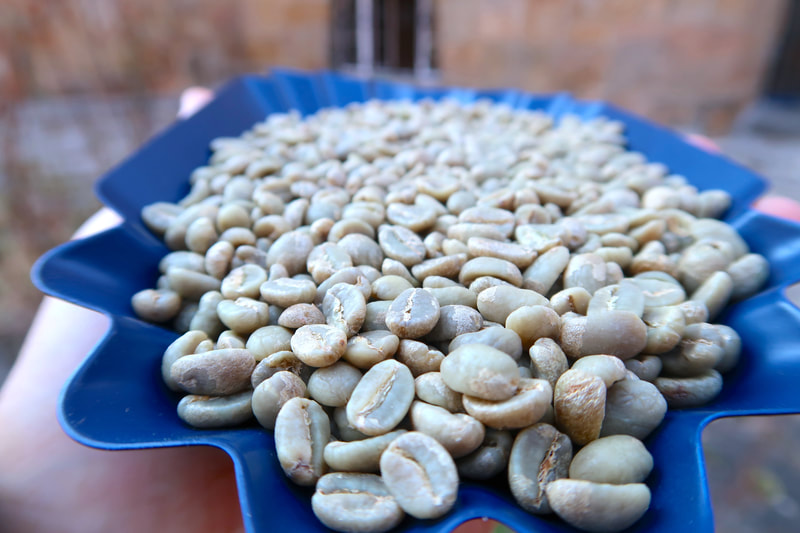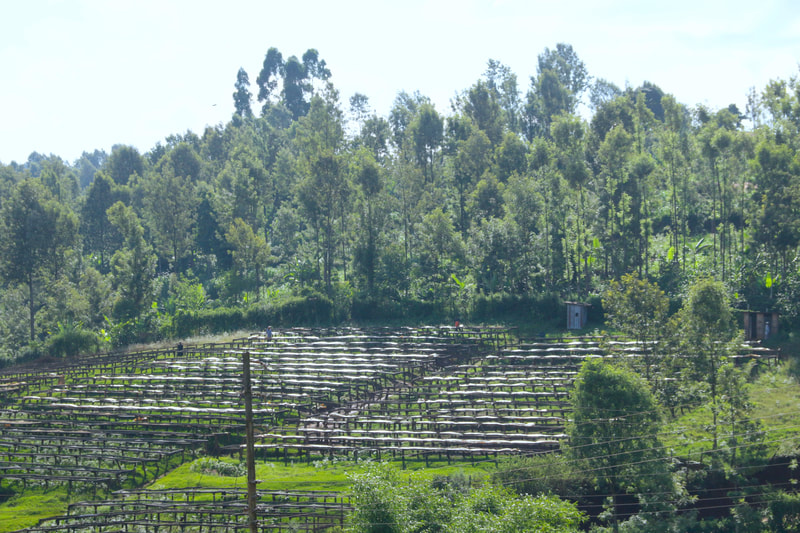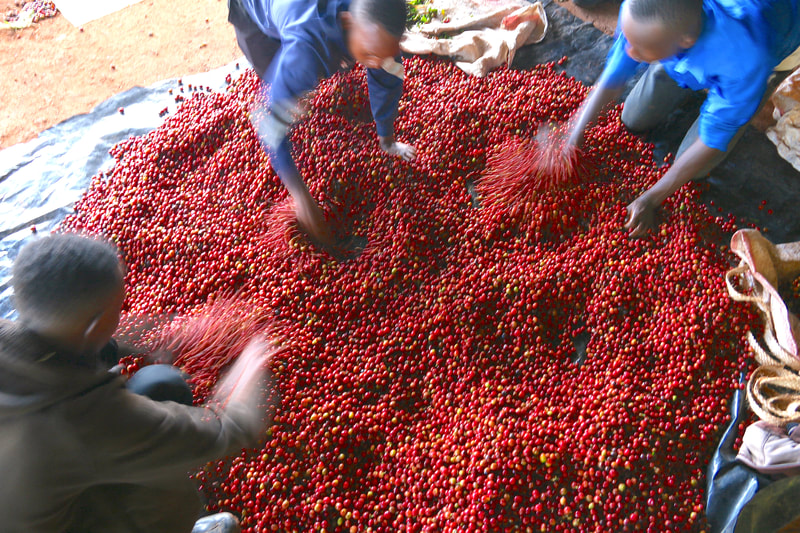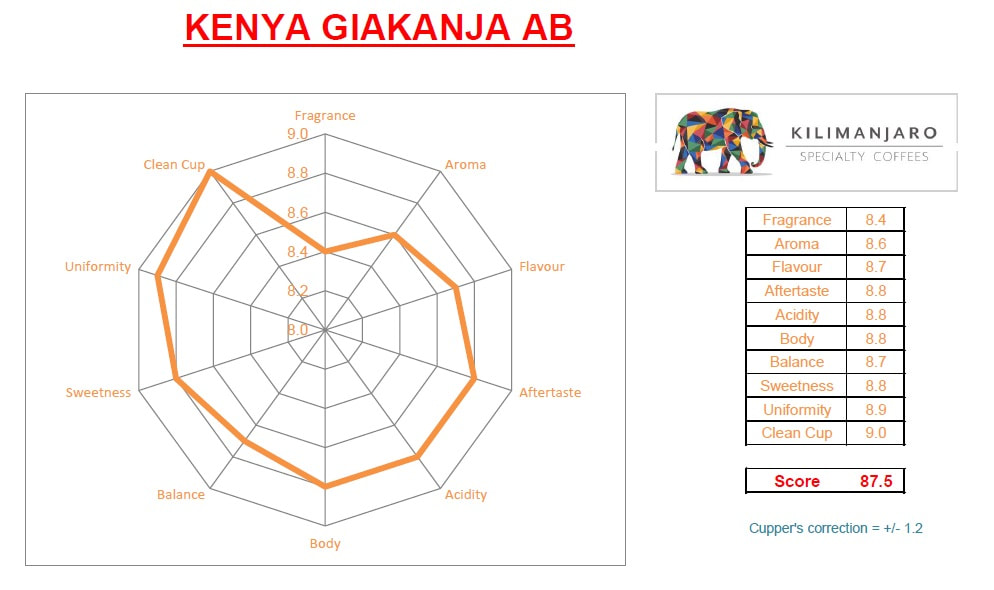KENYA Giakanja AB
General Information
|
Origin: Kenya
County: Nyeri Cooperative: Giakanja FCS Washing Station: Giakanja Farmers: 1467 active members Cultivar: SL28 - SL34 Altitude: 1705 - 1800 masl Process: Fully washed with double fermentation Harvest: November 2020 - January 2021 Cherry Price | FOB Price: No info | 8.73 USD/Kg Screen | Moisture | Density: 15-16 | 10.1% | 0.695 g/ml Packaging: 30 Kg + GrainPro Score: 87.5 Notes: Orange, raspberry, molasses, juicy Ikawa profile: KSC basic profile 50g #2 |
TRACEABILITYGiakanja is a washing station or factory (as they are commonly called in Kenya), located near the town of Nyeri, probably the most famous coffee growing county in Kenya. The coffee farms located in this county lies in between the Southern slopes of the beautiful Mt Kenya and the foothills of Aberdare ridge.
Giakanja sits at 1800 masl with an annual average rainfall of more than 953 mm. The rain falls in a bimodal pattern with two distinct wet seasons, thus it enjoys two blooms and two harvests per year. The soils of the region are red volcanic soils which are deep, rich in organic matter. The Giakanja factory part of the Giakanja FCS was established in 1968, only five years after independence. The coop has 1,467 active members who grows coffee over an area of 194 hectares. The annual average production of green coffee for the Giankanja FCS is 124,680 kgs. For two consecutive years, 2017 and 2018, Giakanja FCS was able to boast the best premiums paid to members in all of Nyeri county. The cherries, after being harvested and delivered to the factory, undergoes a fully washed or wet processing method with double fermentation. The water is pumped to reservoir tanks and then used for pulping and recirculation. After pulping, the coffee is dry fermented overnight, before it's washed in grading channels, then soaked for 24-48 hours in clean water and finally spread out on raised beds for sorting and sun drying. HISTORYDespite its proximity to Ethiopia, coffee was not cultivated in Kenya until 1893, when the "Fathers of the Holy Ghost" (French catholic missionaries), introduced coffee trees from Reunion Island and planted them near Mombasa.
** Interesting Fact: The Bourbon variety was first cultivated on a small island that today is known as "Reunion Island". It is located in Africa, in the Indian Ocean, east of Madagascar. It is considered a region of France and until 1789 its name was "Bourbon Island", in honor of the royal house of the Bourbons. ** In 1896, the first plantations were introduced in Kiambu - Kikuyu district, a very fertile area, which in 1912 already saw large plantations of several acres of expansion; there were mainly cultivated Bourbon and Mokka varieties. While credit for the introduction of coffee in Kenya corresponds to Catholic missionaries, were the English settlers, who accelerated the importance of coffee in the Kenyan economy. Large-scale production of coffee and other crops, were heavily increased to export them into Europe, in order to pay the exorbitant debts generated by the construction of the railway connecting Uganda with the port of Mombasa in 1901. After Kenyan independence from the British Empire in 1963, the long experience and extensive knowledge about coffee production was very well adopted by small local farmers, resulting in the high quality standards with which today Kenyan coffee is known in the world. VARIETIESThere are two particular varieties that attract most of the interest from specialty coffee buyers in Kenya, these are: SL 28 and SL 34.
The Scott Laboratories were hired to develop new cultivars between 1934 and 1963. The development of cultivars SL, was based on the Mokka and Bourbon varieties, which were introduced into Kenya by Scottish and French missionaries, from Yemen and Reunion Island respectively. Today, these two varieties are responsible for most of the top quality coffees produced in Kenya, but they are susceptible to coffee leaf rust and other diseases. Kenya has done a huge job, trying to find disease resistant varieties. The "Ruiru 11" was the first variety to be considered a success by the "Kenyan Coffee Board". Unfortunately, it has not been well received by importers and the specialty coffee industry in general. By the end of 2010, a new variety called "Batian" rust resistant, and which some say has a better cup than "Ruiru 11", was introduced. We will still have to wait a few more years to know its full potential in the cup and productivity. |
THE PROCESS
giakanja FACTORY LOCATION
|
WHERE WE ARE
Barcelona, Spain Santiago, Chile Budapest, Hungary |





